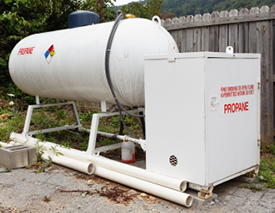
Although many propane and natural gas burn injuries occur at home, many more explosions occur at the commercial level – usually in industrial, manufacturing or agricultural environments.
In land based applications, ageing pipelines and infrastructure can often fracture, causing the pressurized gas to escape with great force and velocity. While in offshore areas – like mining or drilling rigs – having to deal with the added environmental factors of salt water corrosion and weather often makes repairing gas lines a very hazardous occupation.
When compared to other types of burn-causing situations, the potential of serious burn injuries are greatly magnified by both propane and natural gas, simply due to both being EXTREMELY combustible. What this means is that they only take a very small ignition source to set off a huge explosion.
Understandably, due to the high temperatures involved in a propane or natural gas explosion, any victim is very fortunate if they survive the initial fire and blast impact.
Types Of Injuries Caused By Propane Explosions
Natural and propane gas have a very high-temperature burn rate. In fact, even some consumer level propane gas torches can burn at over 1900 degrees F.
Keeping this in mind, in the event of an explosion, due to the large area that is covered in the blast, there are numerous injuries that can be sustained by people that are anywhere close to it.
Some of these burn injuries include:
- lung damage
- internal injuries
- skin damage
- brain damage
- eye damage
- concussion
- spinal cord injuries
…. just to name a few.
Admittedly, surviving a propane or natural gas explosion is quite rare, however, in the event of an injury, IMMEDIATE medical assistance is usually required.
Causes Of Natural And Propane Gas Explosions At Home
As you may expect, a common source of personal injuries from propane or natural gas at home are from the cylinder that is used to fuel many barbeques and cooktops in our homes and on our patios.
Some of the more-common causes are often attributed to:
- incorrectly installed gas cook tops
- split pipes leading to water heaters
- defective control valves and connectors
- perished and leaking hoses
- underground mains leaks
While there are safety mechanisms designed into most propane and natural gas delivery systems, they have been known to fail. In light of this, it is VERY IMPORTANT to check your valves, fittings and pipes at regular intervals.
Preventative Tips & Ideas
Being sure to correctly monitor and maintain any equipment that uses either propane or natural gas is the best place to start when looking to avoid a gas explosion. By keeping a watchful eye on the general condition of hoses, clamps, valves and pipes will ensure that if any problems are found, they will most likely be found with enough time to get it fixed.
Another preventative tip is to move any items that are left outside, and to put them under some type of cover. Outdoor barbeques are often forgotten about and left out to endure the elements – exposing the natural gas cylinder to those same elements.
Most tanks are connected to the burners via a simple rubber hose and clamps – both of which can perish quite quickly. So be sure to take care of them, and if needed – take them to an authorized repairer if they need to be fixed.
Can A Lawyer Help If I Have Been Injured?
In instances where you or a loved one has been injured due to negligence of another – or as a result of a defective product – you may have grounds to file a personal injury lawsuit .
At Gordon & Partners, we currently offer a Free Case Evaluation, which will help us determine if you have a case or not. If so, we will happily advise you on the best course of action to take. Should you decide to pursue compensation for your burn injuries (either personal or property damages), we work on a contingency basis which means that we do not get paid unless we receive a settlement in your case.
With over 150 years of combined legal experience, we have the skills and resources to handle your injury lawsuit and will fight for your MAXIMUM compensation benefits in a court of law.
To find out more, simply call, or fill out the “Free Case Evaluation” form at the top of this page!

 1-855-722-2552
1-855-722-2552